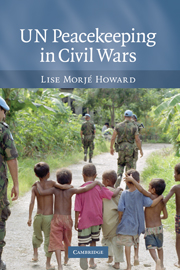Crossref Citations
This Book has been
cited by the following publications. This list is generated based on data provided by Crossref.
Gillis, Stacy
2008.
Noticeboard.
Journal of War & Culture Studies,
Vol. 1,
Issue. 2,
p.
201.
2008.
BIBLIOGRAPHY.
Leiden Journal of International Law,
Vol. 21,
Issue. 3,
p.
739.
Kydd, Andrew H.
2010.
Rationalist Approaches to Conflict Prevention and Resolution.
Annual Review of Political Science,
Vol. 13,
Issue. 1,
p.
101.
Bossong, Raphael
and
Benner, Thorsten
2010.
THE CASE FOR A PUBLIC ADMINISTRATION TURN IN THE STUDY OF THE EU'S CIVILIAN CRISIS MANAGEMENT.
Journal of European Public Policy,
Vol. 17,
Issue. 7,
p.
1074.
2010.
The Politics of Human Rights.
p.
164.
Nikoghosyan, Hovhannes
2010.
Back to the Theory of Humanitarian Interventions.
SSRN Electronic Journal,
Macqueen, Norrie
2011.
The Encyclopedia of War.
Junk, Julian
2012.
Organizing Peace in a Multi-Level System: An Introduction to the Special Issue.
Journal of Intervention and Statebuilding,
Vol. 6,
Issue. 3,
p.
247.
Grevious, Danielle
and
Grussendorf, Jeannie
2012.
The Factors that Explain the Circumstances Under Which U.N. Security Council Member States Authorize Robust Peacekeeping.
DISCOVERY: Georgia State Honors College Undergraduate Research Journal,
Vol. 1,
Issue. ,
Moses, A. Dirk
2013.
Das römische Gesprächin a New Key: Hannah Arendt, Genocide, and the Defense of Republican Civilization.
The Journal of Modern History,
Vol. 85,
Issue. 4,
p.
867.
Karim, Sabrina
and
Beardsley, Kyle
2013.
Female Peacekeepers and Gender Balancing: Token Gestures or Informed Policymaking?.
International Interactions,
Vol. 39,
Issue. 4,
p.
461.
Benson, Michelle
and
Kathman, Jacob D.
2014.
United Nations Bias and Force Commitments in Civil Conflicts.
The Journal of Politics,
Vol. 76,
Issue. 2,
p.
350.
Mari Ainikki Anttila, Ulla
2014.
Human security and learning in crisis management.
Journal of Humanitarian Logistics and Supply Chain Management,
Vol. 4,
Issue. 1,
p.
82.
Spain, Anna
2015.
Black Women and International Law.
p.
120.
Schuberth, Moritz
2015.
A transformation from political to criminal violence? Politics, organised crime and the shifting functions of Haiti's urban armed groups.
Conflict, Security & Development,
Vol. 15,
Issue. 2,
p.
169.
Olsher, Daniel J.
2015.
New Artificial Intelligence Tools for Deep Conflict Resolution and Humanitarian Response.
Procedia Engineering,
Vol. 107,
Issue. ,
p.
282.
Zeigler, Sean M.
2016.
Competitive Alliances and Civil War Recurrence.
International Studies Quarterly,
Vol. 60,
Issue. 1,
p.
24.
Fjelde, Hanne
Hultman, Lisa
and
Lindberg Bromley, Sara
2016.
Offsetting Losses: Bargaining Power and Rebel Attacks on Peacekeepers.
International Studies Quarterly,
Vol. 60,
Issue. 4,
p.
611.
Kaptan, Kubilay
2016.
Retracted: Environmental Conflict between Internally Displaced Persons and Host Communities in Iraq.
Journal of Refugee Studies,
2016.
The United Nations, Peace and Security.
p.
29.



